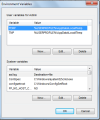hi all,
i have a program that insert arabic language to ms access when i create .jar file for the program and move it to another computer and run the jar file it store the arabic data in the ms access database like that ?????.
note: you must know that when it run in my computer it stores the arabic correctly.
Thanks in advance

